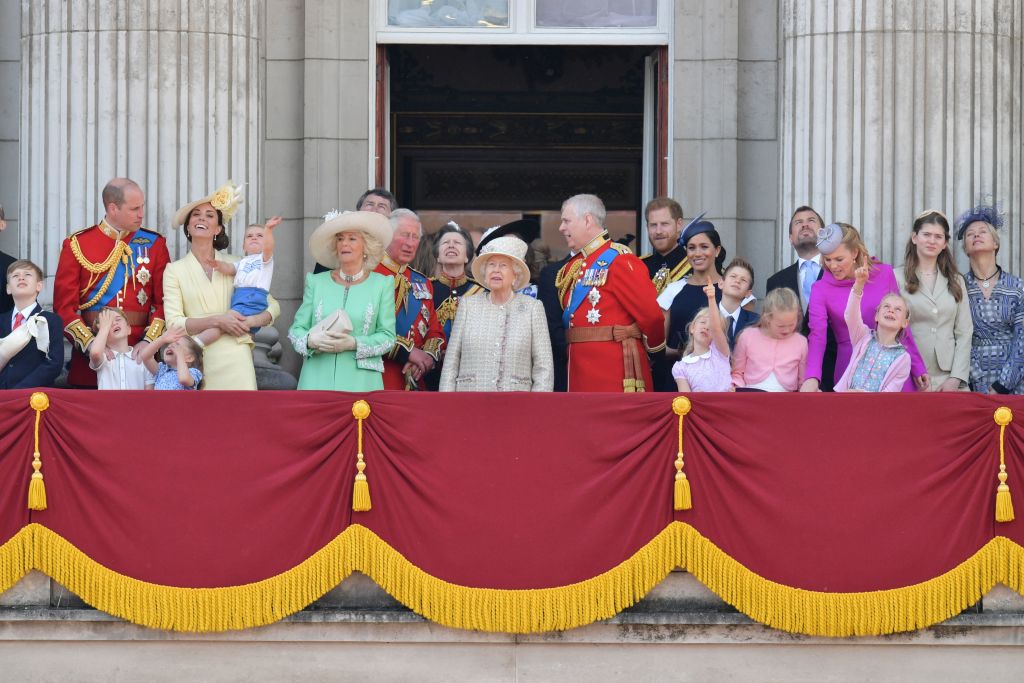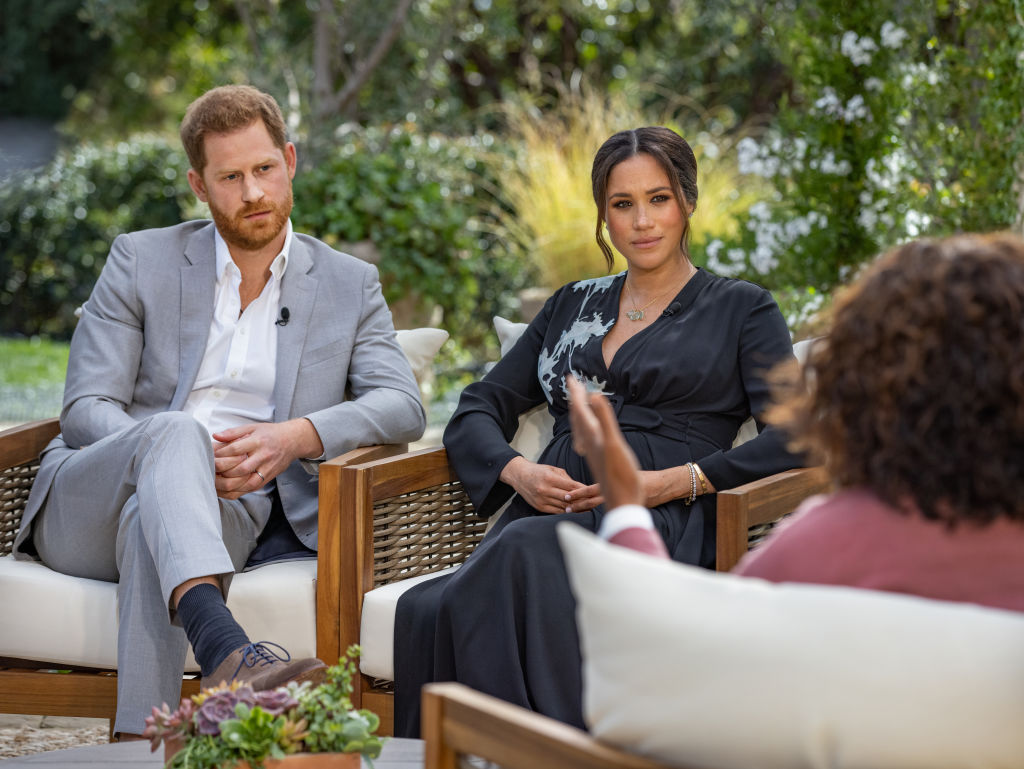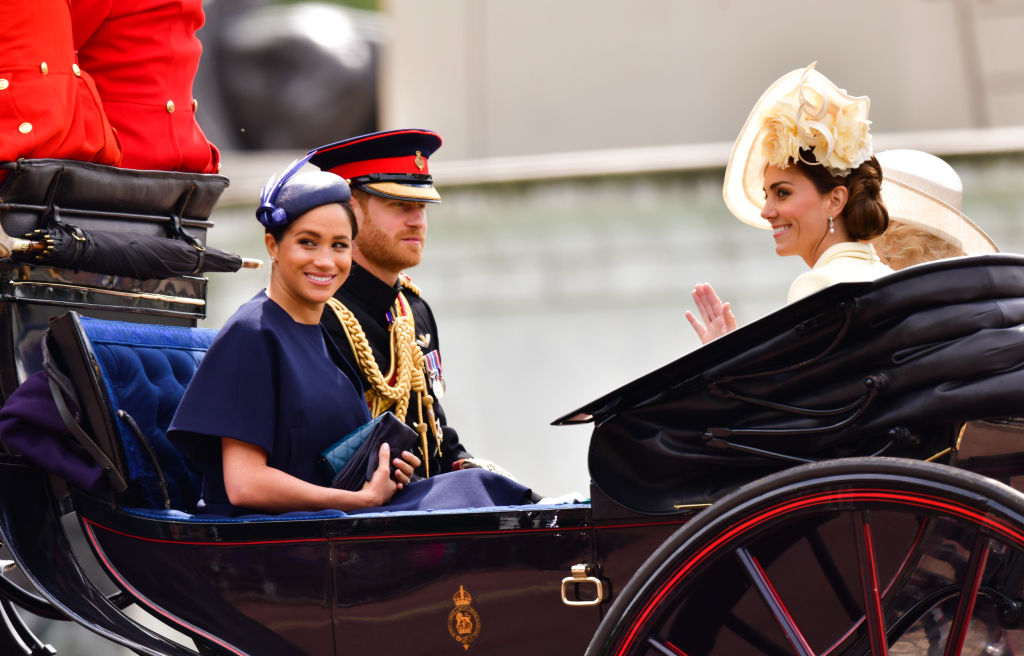
Meghan Markle and Prince Harry are careful. In their riveting interview with Oprah Winfrey aired March 7 on CBS, the former Duke and Duchess of Sussex made sure not to name names when it came to outing their British royal fellows for mistreatment.
But Markle had no qualms in referring to Prince Harry’s family—and the royal apparatus that surrounds it—by a common nickname: “The Firm.”
Here’s what she was referring to.
Where does the term “The Firm” come from?
An unofficial nickname that dates back to the time of Queen Elizabeth II’s father, King George VI, The Firm is an informal title for the British royal family and its associated institutions, including the courtiers, staff and working royals that keep the business of the monarchy functioning. It reportedly stems from King George’s statement that he and the rest of the royals were “not a family, we’re a firm,” a concept first introduced in the mid-20th century. That framing has stuck.

Who is part of The Firm?
The senior royals, obviously—including Queen Elizabeth and Prince Phillip; Prince Charles and Camilla, Duchess of Cornwall; and Prince William and Catherine, Duchess of Cambridge. But the institution also consists of the offices that manage royal affairs, including the Private Secretary’s Office, the Privy Purse and the Treasurer’s Office. These departments, like at any company, manage everything from the Queen’s government relations to finances and human resources. (This broad coalition of employees is officially called the Royal Household, and consists of hundreds of workers.)
During Markle’s interview with Winfrey, she made two distinctions. First, she drew a line between the family and the “institution”: “So, there’s the family, and then there’s the people that are running the institution,” she said. And she drew a line between her personal relationship with the head of the family and her dealings with the institution, saying that Queen Elizabeth “has always been wonderful to me.” In contrast, she said that she requested mental health support from the institution’s HR, but was denied because she was not technically on payroll.
Working royals, while they are part of the organization, do not receive salaries and are prohibited from earning income off of their titles, but are able to access funds from the Sovereign Grant to support their work. Housing is also provided for, and renovations—like those that Markle and Prince Harry were engaged in for Frogmore House—come out of the Sovereign Grant budget as well. This fund is publicly accountable and regularly audited. In the case of Frogmore House, for instance, Markle and Harry paid back the Sovereign Grant for their renovation costs after leaving the U.K.

How does The Firm make money?
In two words: real estate. The Queen is the proprietor of the Crown Estate, real estate holdings across the U.K. that bring in sizable sums in annual appreciation and industry, primarily farming. (She is not the private owner of these estates, but holds them “in right of the Crown” as hereditary possessions.) She then returns the profits to the Royal Treasury, which disburses 15-25% of these funds to the Royal Household as the Sovereign Grant each year. (The remainder goes straight to the government.)
According to a report released in September 2020 and reflecting the prior calendar year, the Sovereign Grant received £82.4 million, or $113.9 million. The majority of that budget came from the Crown Estate income. The family’s income was further supplemented by personal funds from the Queen’s private estate, the Duchy of Lancaster, and Prince Charles’s estate, the Duchy of Cornwall, as well as the Royal Collection of art.
What does The Firm spend money on?
The royal family’s expenditures include travel, events that they host for the organizations they patronize, events they host for the preservation of tradition, staff salaries, and upkeep for their extensive real estate holdings. (In the last year, for instance, the total expenditure was £69.4 million out of the Sovereign Grant, with £21.2 million going toward renovations on Buckingham Palace.) The U.K. government picks up the tab for security for “select” royals in the form of the Metropolitan Police’s royalty protection group.
During the Winfrey interview, Meghan and Harry made clear that one of their biggest concerns—which led them to detangle themselves officially from their royal duties—was a lack of security provided for their newborn son, Archie. Markle’s explanation suggested that since Archie was not provided with a royal title, he was not eligible for security funding. (Markle and Prince Harry were also unable to procure their own incomes while serving as working royals.) When Harry and Meghan decamped to Canada and dispensed with their royal duties, they said that their security was also pulled, despite ongoing threats.
How is The Firm connected to the royal press?
The royal press—called the Royal Rota—and the royal family share a symbiotic relationship, with the press reporting extensively on the family’s events in exchange for access. Given the appetite for royal news in the U.K., the relationship has been lucrative for the media and important for the family in their attempts to maintain relevance and a connection with non-royals without sacrificing privacy. But the proximity of the two was disturbing to the Sussexes. “There’s a reason the tabloids have holiday parties at the palace,” Markle said.
As Winfrey’s interview pointed out, Markle did not experience a positive working relationship with the Royal Rota, especially in comparison to the treatment of other members of the royal family. Her experience of harassment in the tabloids is well-documented. In fact, Markle recently won a part of her suit against Associated Newspapers for privacy invasion and copyright infringement. (A third portion of the suit, around data protection, remains to be argued.)
More Must-Reads From TIME
- The 100 Most Influential People of 2024
- The Revolution of Yulia Navalnaya
- 6 Compliments That Land Every Time
- What's the Deal With the Bitcoin Halving?
- If You're Dating Right Now , You're Brave: Column
- The AI That Could Heal a Divided Internet
- Fallout Is a Brilliant Model for the Future of Video Game Adaptations
- Want Weekly Recs on What to Watch, Read, and More? Sign Up for Worth Your Time
Write to Raisa Bruner at raisa.bruner@time.com